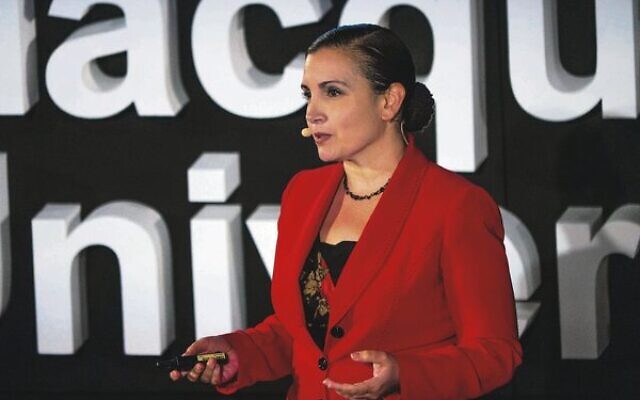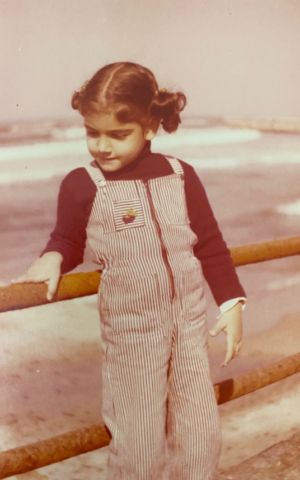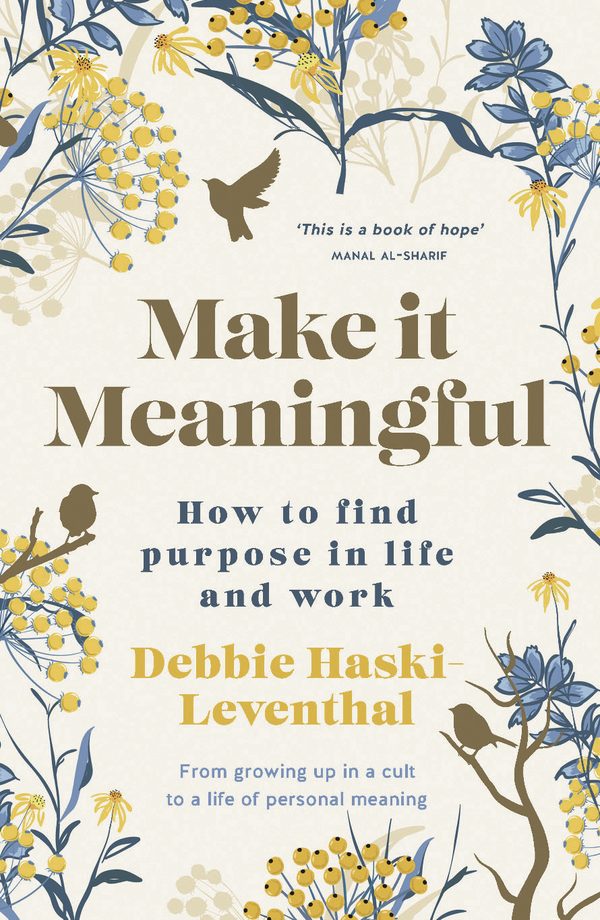Finding purpose and personal meaning
When she was young Debbie Haski-Leventhal's family immersed themselves in the Kabbalah Centre in Tel Aviv, trying to find solace after a family tragedy. When Debbie left, she felt isolated. But turned that feeling into her life's work.

When Debbie Haski-Leventhal was three and living with her family in Israel, her older brother died from cancer. Her memories of this time are vague, but she remembers how her sister “carried a deep sadness around her” and her mother would sit “on the floor constantly crying over her lost son”.
While she now understands the overwhelming grief that her mother was feeling, at the time, as a little girl, it was difficult to comprehend what was going on.
“I always felt like I wasn’t enough to make my mother happy. Once my brother passed away, everything just collapsed,” she recalled to The AJN.
Two years later, Debbie’s mother found the Kabbalah Centre, which was, at the time, a small organisation run by an American-born rabbi and his wife. Debbie’s mother was hooked.

“The Rav, as he was known back then, would sit with my mother and try to help her find meaning in this meaningless tragedy,” she said.
“She, and us, became one of the first devotees of the Kabbalah Centre.”
But, for Debbie, the Kabbalah Centre became a cult-like organisation.
“It was very controlling. They tried to change our identity – who we are, what we think and how we behave,” she said.
At first, Debbie was very involved and wanted nothing more than to represent the organisation, yearning to do “harisha”, which, as Debbie explains in the book, means “ploughing” and involved “walking the streets, knocking on strangers’ doors, selling the Centre’s books and bringing in ‘holy money’”.
When she was given the opportunity to go to Paris, she jumped at the chance. But things began to unravel.
“It was a very difficult experience. I felt very trapped,” she recalled, explaining that there were more than a dozen people living together in one apartment and they weren’t allowed to spend any money.
She said that the Centre didn’t even allow them to buy their own clothes, instead they relied on donated clothing.
She recalls knowing that she couldn’t leave if and when she wanted.
When, due to an injury, she was no longer able to walk the streets of Paris collecting money for the Centre, she was deemed broken.
“I was thrown away like a broken glass,” she said.
Debbie returned home to Tel Aviv and decided she didn’t want to be involved in the organisation anymore.
“It became so twisted that I had to leave. I felt as if the ground I was walking on, all the truths, all the dogmas that were my earth, collapsed [underneath me],” she said. “I was left with nothing, I was just walking on thin air. Any minute now, I’m going to crash down. And it was very frightening. But I went through this very deep meaningful search, keeping a journal with all my thoughts and philosophies, and my values and beliefs. I really looked through everything and said to myself, ‘What do I believe in?’ It was powerful, challenging and lonely. But now, it feels like a privilege.”
Debbie, who now lives in Australia, went on to study philosophy and through her degree, she was exposed to the power of doing good for someone else.
During her first year, she took part in a volunteering program called Perach, which matched children from underprivileged backgrounds with university students who acted as their tutors and role models. Debbie said the program completely changed her.
“When you really do make a difference in someone else’s life, it’s just so powerful,” she said.
She went on to become the volunteer coordinator and the vice-manageress of the entire project. According to Debbie, these acts led her to where she is today, devoting her entire academic career to looking at the positive aspect of humanity.
“I could see how volunteering, for example, made people feel great about themselves. I could see how participating in a company’s corporate social responsibility made people’s work more meaningful. I could see how doing things of impact made your life and your work even more purpose driven. And so, again and again, the evidence came that there is a great way of making your life and work more meaningful through service and impact,” she said.
She was even asked by the United Nations to help write the State of the World’s Volunteerism Report in 2011, contributing a chapter on the positive benefits of volunteering. While writing the chapter, Debbie realised that the biggest beneficiaries of volunteering are the volunteers.
“When you volunteer, yes, you will help someone and you will do something that’s meaningful,” she said. “But you are the one who’s going to benefit the most in sometimes really unexpected and surprising ways.”
Debbie realised that she had such a unique story that could help others see the good in the world. Not wanting to write solely a memoir or a self-help book, Debbie combined the two into Make it Meaningful which aims to help readers find purpose in life and work, a lot of which, despite turning away from Judaism when she left the Kabbalah Centre, comes from her religion.
“Judaism has so much wisdom, so much beauty, so much that I can take away from it,” she said. “I realised that I can just take away from it what I love.”
For Debbie, despite the hardships she faced as a child, volunteering has been a lifesaver.
“Volunteering is a way to invest your good deeds, so they yield more good in the world. And it becomes a cycle, a ripple effect. Someone could do a random act of kindness towards you, and they won’t even know how that went on to shape your life, and you went on to do the same for others.
“Just by being kind to someone, you could really change their life path. And that’s a good thing to remember.”
Make it Meaningful is published by Simon & Schuster, $26.95 rrp.


comments